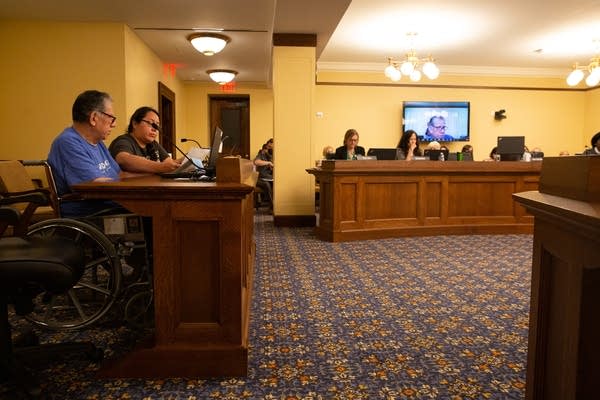Minn. front-line workers appeal for share of pandemic pay

Go Deeper.
Create an account or log in to save stories.
Like this?
Thanks for liking this story! We have added it to a list of your favorite stories.
An ICU nurse, a meat packing worker, a janitor, nursing home aides and others appealed Wednesday for a share of a new fund designed to compensate front-line workers in Minnesota during the COVID-19 pandemic for pay they lost or risks they took.
Testimony before a panel of legislators and state agency heads came from COVID-19 caregivers and people who kept store shelves stocked during early pandemic panic buying. It was from child care providers and food production workers.
Emilio Gonzalez, who worked on a food packaging line, told the panel through an interpreter that he felt compelled to keep going to work until he contracted COVID-19 and almost died from it.
“I contracted this virus last November and up until this day, I am still struggling with the sequels of this deadly virus,” Gonzalez said.
Turn Up Your Support
MPR News helps you turn down the noise and build shared understanding. Turn up your support for this public resource and keep trusted journalism accessible to all.

Minnesota Nurses Association President Mary Turner, who is also an intensive care unit nurse who has tended to COVID-19 patients since the health crisis began, said the risks for care providers have been immense, and it’s not over yet.
Many nurses lost time as they quarantined due to exposure, Turner said, and some had serious personal bouts with COVID-19. Others, like her, bear emotional trauma. She described a harrowing incident where a patient’s breathing tube broke apart as she tended to him.
“I was in the room for 45 minutes holding this tube together as these COVID germs are flying around the room,” Turner said, “and I’m wearing the same mask that I’ve now worn for my eighth shift.”

The panel of six legislators and three state agency commissioners that held its initial hearing Wednesday is supposed to advise the Legislature on dividing up a pool of $250 million.
Determining who falls into the essential worker category will be challenging. Even some of those angling for the money say so.
“Spreading $250 million out to 900,000 people leaves us with around $200 each. That is simply not enough for the sacrifices we’ve made,” said Lake City school paraprofessional Michelle Seydel, using an estimate floating around of the universe who could be in line for a share.
Some lawmakers suggested the level of risk or virus exposure would be a key factor.
Long-term care administrator Dan Colgan donned full gear — surgical mask, face shield and a protective smock — to illustrate how his staff at Redeemer Health and Rehab Center in Minneapolis has approached care during the COVID-19 fight and still does.
“Pretty scary in the event of caring for seniors,” Colgan said. “Kind of like an outer space person, right?”
Colgan said 37 of his 150 employees contracted the virus while working in the unit. Among patients, 22 died, including six in one day.
“This pandemic was unlike anything we had ever encountered in long-term care,” Colgan said. “It’s impossible to immerse you today in what the front line really looks like or feels like.”
Federal law allows up to $13 per hour per person in premium pay using coronavirus relief dollars. Anything above that would have to come from state resources.
The bigger the pool of eligible recipients gets, the smaller the awards would become.
“This is a good start,” said Rep. Cedrick Frazier, DFL-New Hope. “[But] it’s not enough.”
Sen. Erin Murphy, DFL-St. Paul, agreed the panel needs to keep the option of scaling up to the need to avoid bogging down and expressed optimism that something will be done.
“For those who did so much for all of us in the course of this pandemic, I do hope we are able to find our way together to a meaningful result and confound the expectations of those who believe this work is too hard for this body,” Murphy said. “I don’t agree with that and think we will be able to do something important.”
The committee intends to meet regularly throughout August. Recommendations supported by at least seven of nine working group members are due within six weeks or by Labor Day at the latest. Distribution of the money could take considerable time, too, given that they come from many sectors and would need some verification of time worked in dangerous settings.
The overarching goal should be to make the payments meaningful and not a token, as Rep. Anne Neu Brindley, R-North Branch, put it.
“Our charge is to figure out how to disperse $250 million,” Neu Brindley said. “That’s the charge we have regardless of how much we hoped we’d have or wish we’d have. That is how much we have.”


